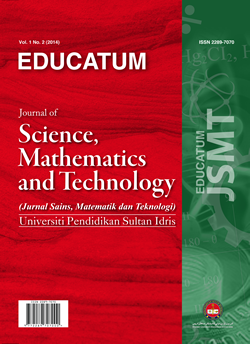Information and Communication Technology Coordinators’ Competence in Public Elementary Schools
DOI:
https://doi.org/10.37134/ejsmt.vol9.1.2.2022Keywords:
Information and Communication Technology, ICT Coordinators, competence, domains and functionsAbstract
This study aimed to determine the level of competence of Information Communication Technology Coordinators in Elementary Schools of Ramon District, Isabela during the School Year 2019-2020. This study used descriptive method of research, employing the questionnaire checklist in gathering data. This method was adopted since the study aimed to find the level of competence of ICT coordinators. Mean was used to determine the level of competence of the ICT Coordinators. Results of the study shows that the respondents have an overall high level of competence on competencies related to technical operations and concepts, and productivity of various ICT tools. The respondents have an overall high level of competence on the standard 2. This implies that the ICT coordinators assumed they were highly skilled in using appropriate office and teaching productivity tools. Moreover, the respondents have an overall high level of competence related to social, ethical, legal and human issues, and community linkage, which means that the ICT coordinators acknowledge they were highly skilled in recognizing and practicing ethical use of technology in both personal and professional level. To effectively assess the level of competence of ICT coordinators, their roles, duties, and functions must be properly defined based on their job description in the Position Description form that every permanent government official obtained upon appointment for a permanent position. Therefore, the position ICT Coordinators should not remain as designation, but, should be included in the Plantilla of Personnel as a new regular item position. The findings of this study may be best translated through the conduct of trainings and seminars to update the ICT Coordinators with new trends and techniques in teaching. Likewise, the Department of Education may craft a policy to clearly define the roles and functions of ICT Coordinators in schools.
Downloads
References
Kazu, I. Y. & Yavulzalp, N. (2008). An analysis of the primary school teachers’ usage of instructional software. International Journal of Emerging Technologies, 3 (1), 45-53. Retrieved from https://goo.gl/WhpZ5X
Kirschner, P., & Woperies, I. G. (2009). Pedagogic Benchmarks for Information and Communication Technology in Teacher Education. Technology, Pedagogy and Education, 12(1), 127-149. Retrieved from https://goo. gl/6etqUs
Cleere, A. J. (2009). An examination of the role of the ICT coordinator in the secondary school system in Ireland. Retrieved from https://goo.gl/r6ejZp
Kyriakidou, M., Chrisostomou, C., & Bank, F. (2010, September). Primary Teachers’ Attitude to the Use of ICT: A comparative study between Cyprus and the UK. Paper presented at the European Conference on Educational Research. Lahti, Finland. Retrieved from https://goo.gl/rykwwi
ASEAN (2011), “We’re Stronger When We’re Connected: ASEAN ICT Masterplan 2015”, Jakarta, Indonesia. Retrieved from https://ccdcoe.org/sites/default/ files/documents/ASEAN-110101-ASEANICTMasterplan2015.pdf
Pinprayong, B., Mohamad, M. A. F. A. F., Fulazzaky, A., Vanderbilt, G., Coyoca, G. S. E., & Johan, C. (2016). AICSTS Social and Humanities Proceeding Education Chapter. Proceeding AICST, 1(1). Retrieved from https://goo. gl/3SMbs2
Buabeng-Andoh, C. (2012). An exploration of teachers ‘skills, perceptions and practices of ICT in teaching and learning in the Ghanaian second-cycle schools. Contemporary Educational Technology, 3(1), 36-49. Retrieved from https://goo.gl/k3XzBU
Wongwuttiwat, J. (2016). Thailand’s ICT Readiness for the ASEAN Economic Community. Electronic Journal of Information Systems in the Developing Countries Vol. 72, No. 8, pp. 1-21. Retrieved from https://doi.org/10.1002/j.1681-4835.2016.tb00525.x
Cleere, A.J. (2009). An examination of the role of the ICT coordinator in the secondary school system in Ireland. M.A. Thesis, University of Limerick.
Goktas, Y., Yildirim, S., & Yildirim, Z. (2009). Main barriers and possible enablers of ICT integration into pre-service teacher education programs. Educational Technology & Society, 12 (1), 193–204.
Derbyshire, H. (2003). Gender issues in the use of computers in education in Africa, DFID: 73. Retrieved from https://goo.gl/gu9LVT
Danner, R. B. (2013). A Survey of ICT Competencies among Students in Teacher Preparation Programmes at the University of Benin, Benin City, Nigeria. Journal of Information Technology Education: Research Volume 12, pp. 33-49. Retrieved from https://goo.gl/NBbUzC





